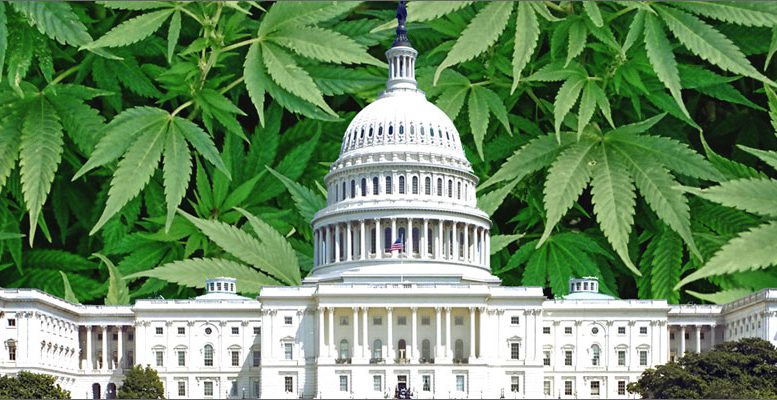
ENERGY AND COMMERCE SUBCOMMITTEE ON HEALTH MET TO DISCUSS SIX CANNABIS REFORM PROPOSALS
Today the Energy and Commerce Subcommittee on Health met to discuss six cannabis reform proposals, which included two proposals that would federally legalize marijuana.
The hearing was comprised mainly of representative asking witnesses from the Food and Drug Administration (FDA), National Institute on Drug Abuse (NIDA) and the Drug Enforcement Agency (DEA) about the obstacles to performing marijuana studies that those same officials claim are needed before putting forward any broader policy reform.
Conversation was limited when it came to legalization bills such as Judiciary Chairman Jerrod Nadler’s (D-NY) Marijuana Opportunity, Reinvestment and Expungement (MORE) Act, which was approved by his panel last year. That said, Rep. Joe Kennedy III (D-MA) who for some time has been an anti-reform member of congress, took a role reversal today stating that this ” “is a critical debate and it is long overdue.”
“Federal prohibition has failed—from our criminal justice system to our healthcare system to our state and local governments that are forced to navigate an impossible landscape…To that end, government officials and elected representatives and important witnesses bring an important perspective to this conversation.”
Joe Kennedy III – congressional hearing Jan 15, 2020
An issue brought forward that doesn’t quite seem an issue at first, but activists can be quick to point out, was stated by Dr. Douglas Throckmorton of the Center for Drug Evaluation and Research.
“With regards to drug development, FDA continues to believe that the drug approval process represents the best way to ensure that safe and effective new medicines, including medicines derived from cannabis are available for patients. The FDA stands ready to provide information to investigators on the progress and process and specific requirements needed to develop a human drug that is derived from plants such as cannabis.
Dr Douglas Throckmorton – Center for Drug Evaluation and Research
The group is not looking at allowing full-plant access or if it is safe, but rather the group is looking at how compounds can be pulled from the plant and marketed as prescription drugs in a manner that they define as safe.
DEA, FDA and NIDA witnesses all agreed under further questioning that the current supply of cannabis for study purposes which comes from the University of Mississippi and possibly imported sources, is inadequate, and the same witnesses agreed that researchers should be able to access a wider range of marijuana and cannabis products to test on subjects.
After pressing the question on how it was not easily available to test and perform trials with cannabis because of being a schedule one substance, Rep Anna Eshoo (D-CA) asked how the FDA or DEA could consider marijuana to be schedule 1. Schedule 1 despite two of the main compounds in question that make up marijuana and place it as schedule 1, are in fact themselves not schedule 1 because they have been proven to have medical benefits and not meet the criteria for schedule 1.
The answer from Throckmorton confirmed that it does have medical applications that benefits people, but would only further address why marijuana is schedule one, “offline.” Eshoo said researchers are “are in a catch-22” under the current regulatory scheme because they “can’t conduct research until they show cannabis has a medical use, but they can’t demonstrate cannabis has a medical use until they can conduct research.”
FDA and NIDA said their agencies would not be impacted if marijuana was descheduled, and DEA’s Strait acknowledged that his agency would because of its responsibility to enforce the CSA.
Rep. Tony Cardenas (D-CA) said that the “United States Congress made a mistake, and every Congress since has not had honest hearings and honest dialogue and has not allowed—truly allowed—the researchers in this great country to do the true research that needs to be done for us to properly categorize cannabis in this country.”
Congressman Greg Walden (R-OR) went as far as bringing in cookies to act as if they were infused with cannabis, to then question everyone in a way to determine if they could know if what they were about to possibly eat contained cannabis. Saying that there was not enough research on the subject like alcohol which is easily abused has research. It was done in a way to make cannabis out to be a poison possibly ingested by unsuspecting children.
Along with that stance, some congress members shared anecdotes about the consequences of prohibition, particularly on patients who stand to benefit from medical cannabis.
Rep. Morgan Griffith (R-VA), for example, recalled that in the 1980s, he knew friends who would smuggle cannabis into a hospital for a man suffering from cancer. Marinol was available as a prescription, but he could not hold down the substance long enough for it work. This prompted the friends smuggling it in so it could be smoked and he could eat a meal. He was a man who wanted to improve his quality of life to spend time with his son. He then further states that it is a sad state of affairs that the FDA says it needs more research, has done none for 3 decades or more, but has been fine with opioids and barbiturates.
Ahead of the hearing, a coalition of cannabis reform groups—including the National Cannabis Industry Association, Cannabis Trade Federation and Minority Cannabis Business Association—sent a letter to subcommittee leadership ahead of the meeting, encouraging members to take action on the various pieces of legislation.
BREAKING: Cannabis industry groups send letter urging descheduling and federal regulation to increase research improve public safety and address harms caused by prohibition.
— National Cannabis Industry Association (@NCIAorg) January 14, 2020
With: @CanTradeFed, @MinCannBusAssoc, @FollowNCR, @GlobalCannaComm #CannabisPolicy pic.twitter.com/ZPdEJskzi0
Want to see the whole hearing? One can watch the whole hearing below via Youtube.



